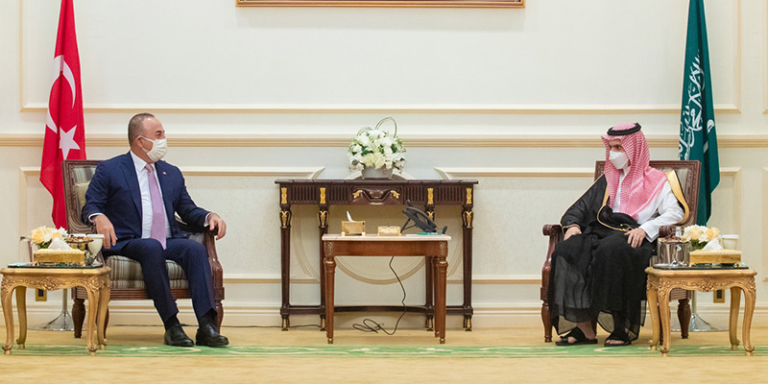
A flurry of diplomatic outreach involving Iran, Syria, and Turkey, and a continuing warming of relations with other Gulf countries, have sparked questions over whether recent shifts in Saudi Arabia’s foreign policy are strategic or tactical and anything more than a reaction to the Biden Administration taking office. It is certainly the case that Crown Prince Mohammed bin Salman (MbS) has an interest in drawing a line under his missteps during the era of former President Donald Trump and persuading a skeptical new administration that he can start afresh. It is also the case that the refocusing of Saudi regional policies significantly predates the transfer of power in Washington and is reflective of an increased sense of uncertainty and vulnerability in Riyadh since at least 2019.
To understand and contextualize the recent Saudi moves, it is necessary to revisit the attacks on maritime and energy targets in and around Saudi Arabia and the United Arab Emirates (UAE). These began with attacks on the Saudi East-West pipeline and on shipping in May and June 2019 and culminated in the missile and drone strikes on the Abqaiq oil processing facility and the Khurais oil field on September 14. Although Saudi authorities quickly repaired the damage that initially knocked out half their oil output, the attack had a lasting impact that extended beyond the inability of the kingdom’s conventional air defense systems to identify and intercept the threat posed by low-flying drones and cruise missiles.
Two days after the Abqaiq and Khurais attacks, President Trump declared, “That was an attack on Saudi Arabia, and that wasn’t an attack on us.” The fact that there was no discernible American response to the attack on the energy heartbeat of Saudi Arabia was consistent with the lack of an overt US reaction to the earlier strikes on energy and maritime targets in May or June 2019. By contrast, the Trump Administration did respond when US assets were targeted and hit, as after the shooting down of an American drone over the Gulf in June 2019 and the killing of an American contractor in Iraq the following December.
American vs. Gulf Interests
Trump’s distinction between US and Saudi interests likely came as a considerable shock to Mohammed bin Salman (as well as to Mohammed bin Zayed, the crown prince of Abu Dhabi). Until 2019, the dominant assumption held by many was that there was little if any separation of American interests from those of regional partners in the Gulf, especially when it came to Iran. Ironically, the shock to Riyadh and Abu Dhabi at the sudden calling into question of the reliability of the US security umbrella (and the regional deterrence it was perceived to provide) mirrored the shock felt in Doha after Trump initially supported the Saudi and Emirati June 2017 decision to sever political and economic ties with Qatar and impose a land, sea, and air blockade on it.
Until 2019, the dominant assumption held by many was that there was little if any separation of American interests from those of regional partners in the Gulf, especially when it came to Iran.
The realization in Riyadh and other Gulf capitals that they were more on their own than perhaps had been assumed had immediate consequences. Iraqi and Pakistani officials reportedly played a mediating role and passed messages between Saudi and Iranian officials aimed at de-escalating tensions in the aftermath of the September 2019 oil field attacks. The rhetoric from Riyadh and Abu Dhabi also shifted markedly after the escalation in US-Iran tensions that led to the American killing of General Qassim Soleimani, the commander of Iran’s Quds Force, in a drone strike at Baghdad International Airport on January 3, 2020. Emirati officials had reached out to Iran in July 2019 to make it clear that they did not want a war in the Gulf, while in January 2020, MbS dispatched his brother, Deputy Defense Minister (and former Saudi Ambassador to the United States) Prince Khalid bin Salman to Washington to make the case for de-escalation.
Rehabilitating MbS’s Image
Such is the backdrop to the more recent efforts to portray Mohammed bin Salman as a statesman capable of engaging in regional diplomacy and learning from the many missteps that marred his rise to prominence in Saudi Arabia between 2015 and 2018. Joe Biden’s victory in the presidential election in November 2020 and the Democratic capture of both houses of Congress reinforced the need for a new approach that might convince skeptical Democrats that MbS had changed. While Biden’s labeling of Saudi Arabia as a “pariah” state in 2019 was campaign rhetoric, a more substantive essay written in June 2020 by Daniel Benaim, who joined the Biden Administration in January 2021 as Deputy Assistant Secretary of State for Arabian Peninsula Affairs, proposed a six-month “strategic review” as part of a “course correction” of US-Saudi relations.
The uptick in Saudi diplomacy may therefore be little surprise given regional and international developments since 2019. After more than three years of stasis, the Saudis ended the rift within the Gulf Cooperation Council (GCC) and placed Mohammed bin Salman front and center at the reconciliation summit that took place at the Saudi heritage site of Al-Ula two weeks before Biden took office. As in previous times of regional uncertainty, Gulf leaders have drawn closer and rallied in support of the Saudi leadership in response to the February 2021 release of American intelligence findings into the murder of Washington Post columnist Jamal Khashoggi in the Saudi consulate in Istanbul in October 2018. Qatar’s Emir Tamim visited MbS in Jeddah on May 10, 2021 and King Salman has extended an invitation to Oman’s new sultan, Haitham bin Tariq Al Said, to visit the kingdom as regional fences continue to be mended.
As in previous times of regional uncertainty, Gulf leaders have drawn closer and rallied in support of the Saudi leadership.
To the extent there is any discernible common thread in the reports of Saudi outreach to Iran and Syria, and possible détente with Turkey, it is likely to be a desire to better manage regional “files” after a period of unusual turbulence in regional and international politics. King Salman’s age and uncertain health mean it is entirely possible that Mohammed bin Salman will succeed him during Biden’s term in office, and successions in other GCC states, especially the UAE, may also be imminent. Now is likely not the time to risk reopening vulnerabilities that are better addressed through cooperation over confrontation.
From Riyadh’s perspective, the Biden Administration has recommitted the United States to the defense of Saudi Arabia in the face of continuing Houthi attacks launched from Yemen. Such a move demonstrates the upsides to engaging closely with international partners on regional affairs and could also be an objective in the meetings between Saudi and Iranian officials. Mohammed bin Salman needs to find a way to disengage from Yemen without it appearing like a strategic or an operational defeat. In addition, Saudi officials could potentially engage their Iranian (and Omani) counterparts on ways to incentivize the Houthis to enter negotiations, or at least to try and tilt the balance within the Houthi movement in favor of those committed to a political rather than a military solution in Yemen. That might be a long shot, but the Saudis do not have many options left in Yemen. Further, the costs of continuing the war could usefully be redirected toward domestic measures to support and accelerate post-pandemic economic recovery in the kingdom.

